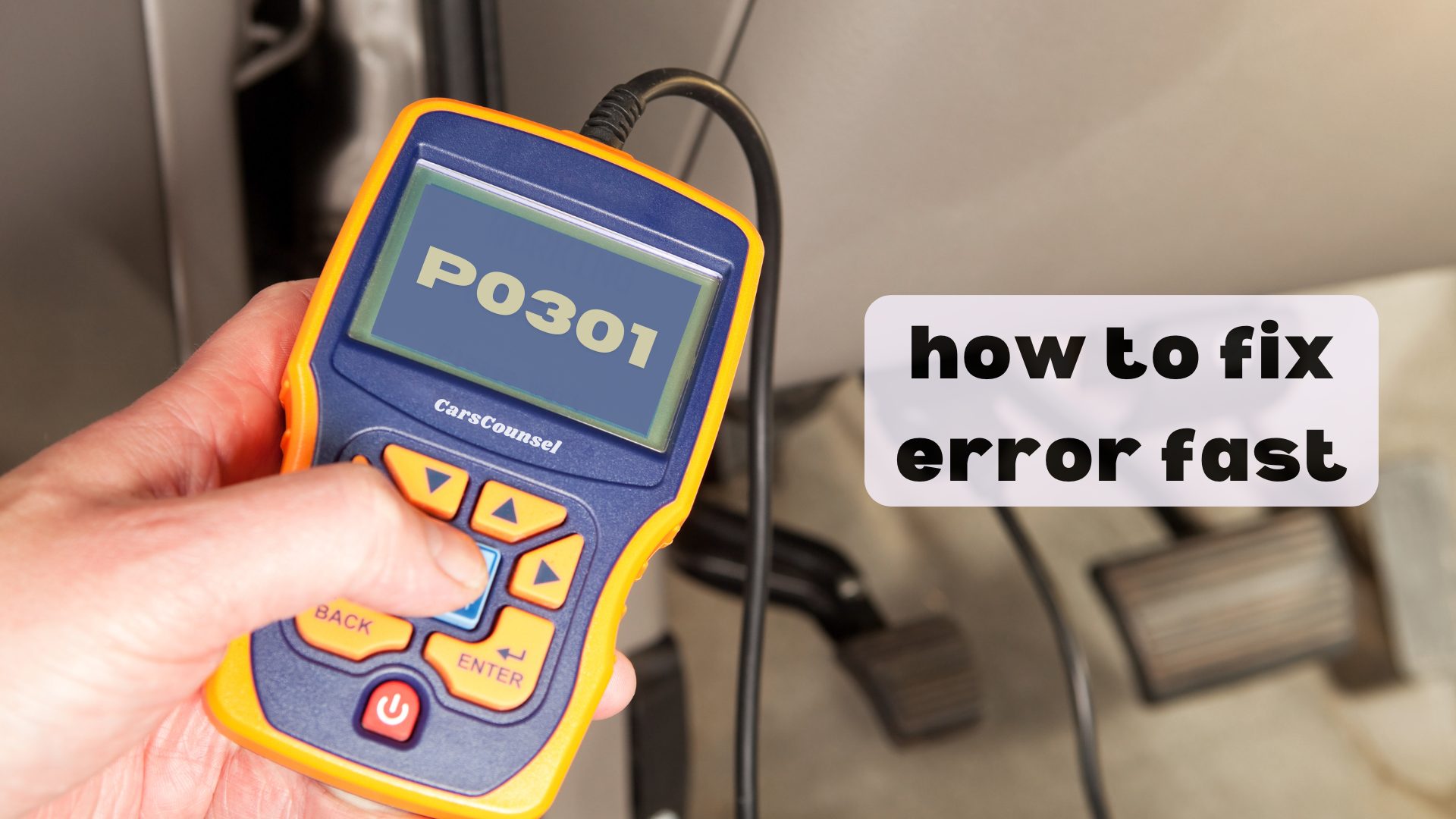Dealing with the P0301 code can be annoying, especially if you’re not familiar with engine issues. This code means there’s a misfire in cylinder 1, and fixing it quickly is important to keep your car running well.
Start by looking at the spark plugs and ignition coils since they often cause this problem. But don’t stop there; you should also do a thorough check, including compression tests and looking at the fuel injectors.
Want to know how to keep your engine running smoothly and avoid future misfires? There are more OBD2 Codes related tips you should know for a hassle-free driving experience.

Quick Navigation
Key Takeaways
- Check the spark plug in cylinder 1 and replace it if it’s dirty, damaged, or worn out.
- Test the ignition coil for cylinder 1 and replace it if it’s not working properly.
- Clean or replace the fuel injector for cylinder 1 to make sure it’s delivering fuel correctly.
- Use an OBD-II scanner to find and clear error codes, and make sure there are no other problems.
What Is the P0301 Code?
The P0301 code means there’s a misfire in cylinder 1. This happens when the engine’s computer detects that the crankshaft isn’t moving as smoothly as it should. If you have this code, you might notice the engine idling roughly, stalling, or losing power.
To figure out what’s wrong, start by checking the spark plugs to see if they’re dirty or worn out. Next, look at the ignition system, including the coils, wires, and distributor cap, for any damage. You can also do a compression test to see if cylinder 1 isn’t working as well as it should.
Using diagnostic tools like scan tools and pressure gauges can help you find the exact problem. Don’t forget to check the fuel injectors for clogs, as they can mess up the air-fuel mixture needed for combustion.
Taking care of these issues quickly will help keep your car running well and prevent bigger engine problems down the road.
Implications of the P0301 Code
If you see a P0301 code, it means your engine isn’t running right because one of the cylinders is misfiring. This can make your car feel sluggish and waste more fuel.
If you don’t fix it soon, it could cause serious engine damage. You’ll probably notice rough idling and trouble accelerating, which makes driving harder and can wear out other engine parts, leading to expensive repairs.
Fixing this issue quickly helps your car run smoothly and efficiently, saves fuel, and keeps your engine in good shape. Taking care of it right away can prevent bigger problems and costly downtime.
Common Causes of P0301
A P0301 code usually means there’s a problem with the spark plug in cylinder 1. If the spark plug is faulty or blocked, it can’t ignite the fuel mixture properly, causing misfires.
You should also check the ignition coil, which boosts the power needed for ignition. Clogged fuel injectors can also mess with the fuel delivery, disrupting the air-fuel mix needed for the cylinder to work right.
Vacuum leaks can prevent enough air from getting into the cylinder, leading to misfires. Problems with fuel injection can also affect engine performance.
All these issues can trigger a P0301 code, so it’s important to thoroughly check each one to find and fix the problem.
Faulty Spark Plugs
When dealing with the P0301 code, first check the spark plugs. A bad spark plug in cylinder 1 can mess up the ignition and cause misfires. Keeping your spark plugs in good shape is crucial for your engine.
Here’s what to do:
- Look at the spark plug: Check for dirt, damage, or wear. If it looks worn out, replace it.
- Check the gap: Make sure the spark plug gap matches what the manufacturer recommends. A wrong gap can cause misfires.
- Replace old spark plugs: If one is bad, think about replacing all of them, especially if they’ve been used for a while.
Regular spark plug maintenance can help prevent misfires and keep your engine running smoothly.
Ignition Coil Problems
A bad ignition coil can mess up the power going to your spark plugs, causing the P0301 code to show up. Ignition coils change the car battery’s low voltage to the high voltage needed to ignite the fuel and air mix in the engine. When they go bad, you’ll get misfires and poor engine performance.
To avoid these problems, check your ignition coils regularly. Look for signs like cracks or rust. If you see any, you’ll need to replace the coil to get things working right again.
Always use a digital multimeter to test the coil before deciding to replace it. Keeping your ignition coils in good shape helps you avoid the hassle and potential damage from a P0301 code.
Diagnosing the P0301 Code
After checking for any issues with the ignition coil, the next step in diagnosing the P0301 code is to look at the spark plugs for any signs of fouling, damage, or wear.
Use a diagnostic tool like an OBD-II scanner to find any error codes. Also, perform a compression test to check the compression levels in each cylinder.
Here’s what you need to do:
- Check the Spark Plugs: Look for any signs of wear, damage, or fouling. Replace them if needed.
- Use Diagnostic Tools: Use an OBD-II scanner and a digital multimeter to test the ignition system and find out what’s wrong.
- Do a Compression Test: Measure the compression in cylinder 1 to make sure it meets the manufacturer’s standards.
These steps will help you figure out what’s causing the P0301 code.
Fixing the P0301 Code
To fix the P0301 code, start by replacing any bad spark plugs and ignition coils, as these are often the main reasons for cylinder 1 misfires.
Use proper engine diagnostics to find the exact issues.
Clean or replace clogged fuel injectors to ensure good fuel flow.
Repair any vacuum leaks by fixing damaged hoses or gaskets to keep the air intake working right.
Do engine compression tests to find serious internal problems.
Regular maintenance, like checking fuel injection and air delivery systems, keeps the engine running smoothly.
Affected Car Models
Common Car Models with P0301 Code Issues
Some car models are more likely to experience the P0301 code, which often points to problems with spark plugs, ignition coils, or vacuum leaks. Knowing these common issues can help you keep your car in good shape and ensure your engine runs smoothly.
Here are some key points for specific models:
- Ford F-150: Often has problems with spark plugs and ignition coils, which can hurt engine performance.
- Honda Civic: High-performance versions often face issues with fuel injectors.
- Toyota Camry: Frequently deals with vacuum leaks and problems with the distributor.
Driving With a Misfire
Driving with a misfire, especially if you see a P0301 code, can really mess up your engine and make your car perform poorly. You might notice your car idling roughly, accelerating slowly, or using more gas than usual.
Ignoring these signs isn’t safe because your engine could stall or lose power when you need it most. The P0301 code means there’s a problem with cylinder 1, which could be due to bad spark plugs, ignition coils, or fuel injectors.
You should fix this right away. If you keep driving like this, you’ll not only damage your engine more but also end up with higher repair bills. Fix the problem soon to keep your car running safely and reliably.
Preventative Measures
To avoid dealing with the P0301 code and the related engine problems, you should regularly maintain your vehicle’s key systems. By focusing on regular upkeep, you can keep your engine healthy and ensure it runs smoothly.
Here are three essential tips:
- Check and Replace Spark Plugs Regularly: Look for wear and change them as recommended by your vehicle’s manufacturer.
- Take Care of the Ignition System: Check ignition coils, wires, and distributor caps regularly for any signs of damage or wear.
- Clean Fuel Injectors: Clean or replace fuel injectors from time to time to ensure proper fuel delivery and efficient combustion.
Paying consistent attention to these areas will help prevent misfires and keep your engine reliable.
More OBD-II Codes
Frequently Asked Questions
How Much Does It Typically Cost to Repair a P0301 Code?
Fixing a P0301 code usually costs between $100 and $200 for parts like spark plugs or coils. Diagnosing the issue typically costs between $50 and $100. So, the total cost can be around $150 to $300, depending on how serious the problem is.
Can I Reset the P0301 Code Myself After Fixing the Issue?
Resetting the P0301 code yourself is like hitting the refresh button. You can clear the code by disconnecting the battery for 15 minutes or using an OBD2 scanner. This ensures the engine’s misfire issue is resolved.
What Tools Are Required for Diagnosing a P0301 Code at Home?
To diagnose a P0301 code at home, you’ll need a code reader or scanner, a digital multimeter, and some basic hand tools. Check the ignition system parts, like spark plugs and coils, and use the scanner to get detailed error codes.
Are There Any Temporary Fixes for a P0301 Code?
For a quick fix, you can try swapping the spark plugs or ignition coils with those from other cylinders. You can also clean the fuel injector with a cleaner. These steps might help for now, but you’ll need a permanent repair to make sure your car runs well.
How Long Does It Take to Fix a P0301 Code?
You can fix a P0301 code in a few hours by checking and fixing the problem. This usually means inspecting the spark plugs, ignition coils, and fuel injectors, then replacing or repairing any faulty parts.
Conclusion
To sum it up, fixing the P0301 code quickly means closely checking the spark plugs, ignition coils, and for any vacuum leaks.
Regular maintenance can prevent these issues and keep your engine running smoothly.
By addressing these problems directly, you’ll not only fix the misfire but also boost your car’s overall performance.
Stay on top of it, and your car will reward you with a dependable ride.

